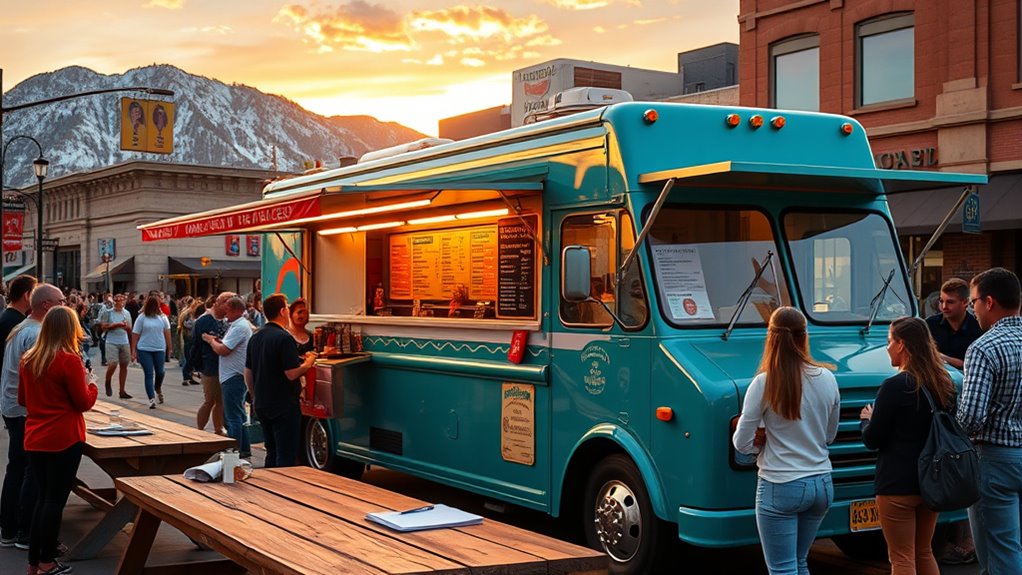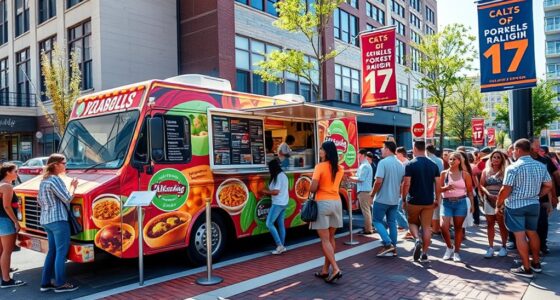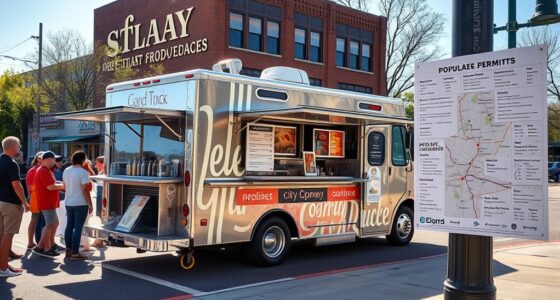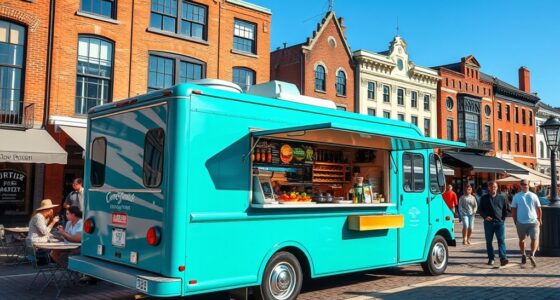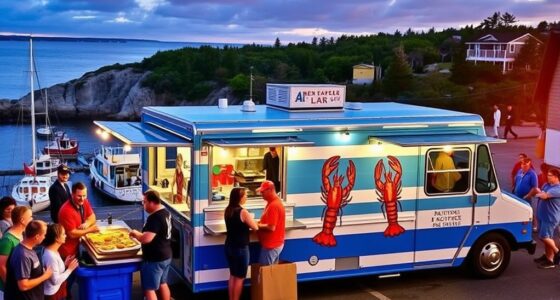To start a food truck in Bozeman, you’ll need permits from the Montana Department of Public Health, passing health and fire inspections, and obtaining a business license. Startup costs range from $40,000 to over $120,000, covering equipment, truck build-out, and permits. You can park in high-traffic areas like downtown and events, but must follow local rules. Focus on compliance, an appealing menu, and effective marketing to succeed. For detailed steps and tips, continue exploring this guide.
Key Takeaways
- Obtain necessary permits and licenses from the Montana Department of Public Health and local authorities, including health and fire safety inspections.
- Budget $40,000–$120,000 for truck, equipment, permits, and ongoing expenses like fuel, ingredients, and maintenance.
- Park in high-traffic areas like downtown, event venues, or food truck parks with proper approval and adherence to parking regulations.
- Develop a simple, compliant menu focused on local tastes, ensuring equipment meets sanitation standards and fire safety requirements.
- Promote your food truck through social media, community events, partnerships, and consistent locations to build customer loyalty.
Navigating Permits and Licensing Requirements

To operate a food truck in Bozeman, you’ll need to navigate a series of permits and licensing requirements set by local and state agencies. First, obtain a valid license from the Montana Department of Public Health and Human Services (MDPHHS). You’ll need to complete a detailed application that includes establishment info and submit it to the local health authority. Licenses are specific to owner and location, so any changes require notifying Environmental Health Services. You’ll also need to pass health and safety inspections prior to licensing, including a routine annual food truck safety check by the Bozeman Fire Department. Additionally, food handlers must complete at least 8 hours of approved food safety training, with proper documentation required during the licensing process. Regulatory compliance is essential for legal operation, and staying compliant guarantees smooth operation and avoids penalties. Maintaining up-to-date permits and documentation is crucial to prevent delays or fines.
Estimating Startup and Operating Expenses

Understanding your startup and ongoing expenses is key to launching a successful food truck in Bozeman. You’ll need to budget carefully to cover essential costs and ensure profitability. 1. Initial Investment: Expect to spend between $40,000 and $120,000 on a truck or trailer, plus $15,000 to $60,000 for build-out and equipment. Don’t forget propane, which costs $1,200 to $2,500 annually. Choosing the right vehicle is crucial for long-term efficiency and reliability. Truck or trailer purchase costs vary widely based on size and condition. 2. Permits and Licenses: Licensing fees vary but generally stay affordable, with health inspections costing $200 to $500 yearly and other permits adding up. 3. Operational Costs: Monthly expenses like fuel, ingredients ($1,000 to $2,000), labor, and utilities will impact your margins. Budget for marketing, event fees, and community outreach to grow your brand.
Choosing Permissible Food Truck Locations
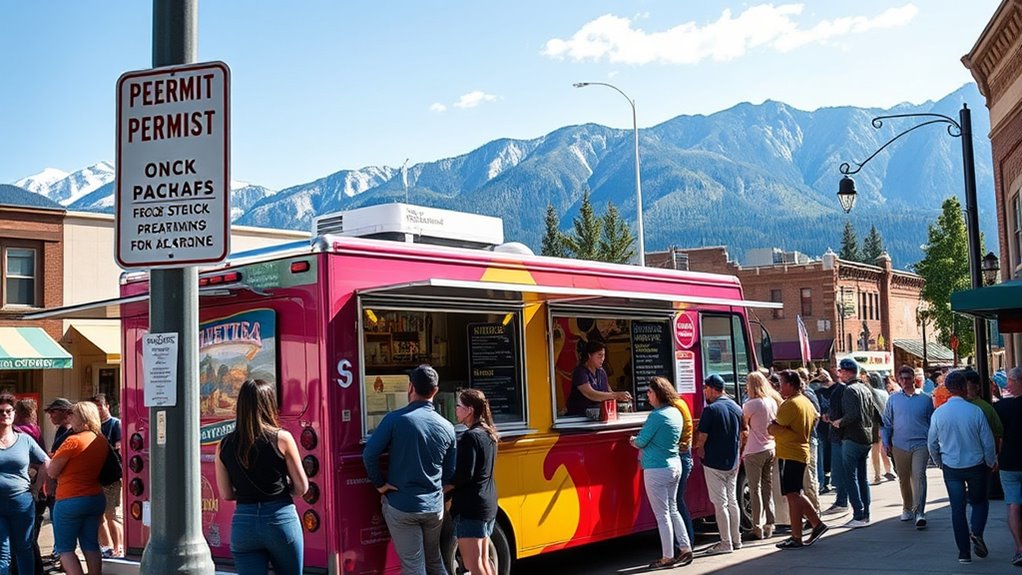
Choosing the right location for your food truck in Bozeman involves steering through city regulations, community norms, and event requirements. You need a valid business license and must pass a health department inspection before operating. While you’re generally free to park anywhere within city limits, you must follow parking signs and regulations. Downtown areas have informal agreements to avoid setting up directly in front of restaurants during business hours, helping maintain good relations with local businesses. When changing locations, notify the health department for approval, since licenses are site-specific. For special events, like the Cruisin’ on Main, you’ll need to apply early, complete safety inspections, and follow event-specific rules. Most local food truck owners voluntarily avoid parking in front of restaurants during business hours out of respect. Cooperation and respect are key to choosing suitable, permissible spots in Bozeman. Additionally, understanding parking regulations and local community expectations can help prevent conflicts and ensure smooth operations.
Planning Your Menu for Compliance and Success
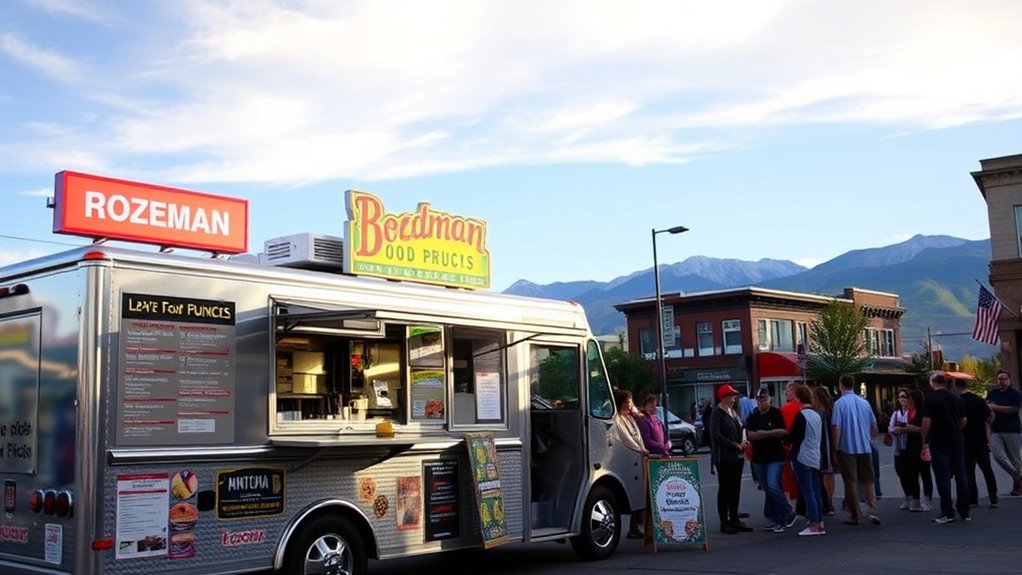
When planning your menu, you need to guarantee it meets local health regulations and fire safety standards to get approval smoothly. Choosing simpler, focused offerings makes compliance easier and streamlines your operations. Keeping equipment and storage in mind will help you avoid costly mistakes and maintain food safety. Additionally, ensuring your menu items do not require complex cooking equipment can simplify fire safety inspections and reduce potential hazards related to fire safety codes. Incorporating specialized kitchen tools can further enhance safety and efficiency in your food truck operations.
Menu Approval Process
Are you aware that securing menu approval is a crucial step in launching your food truck operation? Without it, your license won’t be issued. The process involves submitting a detailed food establishment plan review packet to Environmental Health Services (EHS). This packet must include your menu’s food categories, especially TCS foods like baked goods or processed meats, along with projected meal numbers and hours of operation. Additionally, ensuring your menu complies with the latest safety standards, including those related to grease-laden vapor suppression systems, is essential for a smooth approval process. Here are three key points to guarantee success:
- Accurately describe your menu items, handling methods, and food sources.
- Include current food codes and confirm on-site compliance documentation.
- Prepare for potential menu modifications that may require re-review before approval. Staying informed about food safety regulations can help prevent delays during the approval process.
Following these steps guarantees your menu aligns with safety regulations, paving the way for a smooth launch.
Equipment & Storage Standards
Ensuring your food truck’s equipment meets design and cleanliness standards is vital for maintaining food safety and operational efficiency. Your equipment should have smooth, non-absorbent surfaces for easy cleaning, with seamless joints to prevent debris buildup. It must be constructed from non-toxic, corrosion-resistant materials. Size and capacity are essential: refrigeration units need to keep foods at or below 41°F, while hot holding should maintain at least 135°F. Properly installed water tanks and plumbing ensure sanitation, and equipment must be movable or sealed for thorough cleaning. Shelving and storage should prevent overcrowding and allow air circulation for drying. Here’s a visual overview:
| Design & Cleanability | Capacity & Installation |
|---|---|
| Seamless joints | Adequate refrigeration |
| Non-absorbent surfaces | Proper water tanks |
| Easy to clean | Sealed joints |
| Repairable equipment | Movable or sealed units |
Food Safety Regulations
Planning your menu with food safety regulations in mind is essential for a successful and compliant food truck operation. Your menu must consider local rules on equipment use, sanitation, and allergen labeling. To guarantee safety and compliance:
- Design menus around approved equipment to prevent cross-contamination and meet sanitation standards.
- Include strict temperature controls for raw or high-risk ingredients, minimizing foodborne illness risks.
- Label allergens clearly and follow policies on employee health to protect customers and stay compliant.
You must also ensure proper handwashing stations, sanitized contact surfaces, and fire safety measures are in place. Regular inspections and permits are vital, so aligning your menu with these regulations isn’t just smart — it’s necessary for long-term success.
Promoting Your Food Truck at Local Events

Promoting your food truck at local events requires strategic planning to maximize visibility and attract new customers. Participating in food truck festivals like the Cancer Support Community Montana Food Truck Festival offers high-profile exposure and community engagement. These events, often held at central locations such as Gallatin County Fairgrounds, draw diverse crowds enthusiastic to try various cuisines. Collaborate with organizers who handle promotion and logistics to boost your reach. Regular venues like Farmers’ Markets and food truck parks on West Babcock Street provide consistent foot traffic and brand awareness. Additionally, leverage social media to share event schedules, menu specials, and location updates, engaging followers and encouraging visits. Building relationships with local businesses and event organizers can open doors to private and corporate events, expanding your customer base further. Event details like the Cancer Support Community Montana Food Truck Festival provide excellent opportunities to showcase your menu and connect with the community. To ensure successful participation, familiarize yourself with the necessary permits and regulations involved in hosting and operating at these events.
Ensuring Regulatory Compliance and Inspection Readiness
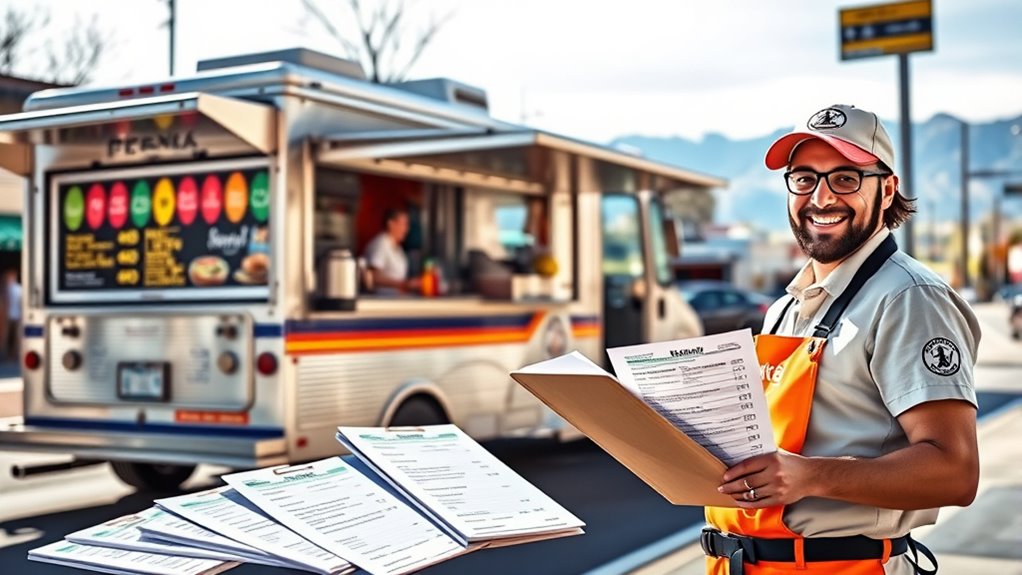
Staying compliant with regulations and preparing for inspections is essential for your food truck’s successful operation in Bozeman. You need to stay ahead by understanding and meeting all licensing and safety standards. A comprehensive knowledge of forsale 100 can help you source affordable equipment and supplies necessary for compliance. 1. Obtain and maintain all necessary licenses and permits, including the food service establishment license and mobile vending business license, with proper signage plans and pre-opening inspections. 2. Be inspection-ready at all times** by adhering to Montana’s sanitation standards, keeping documentation accessible, and maintaining your truck to prevent violations. 3. Respond promptly to inspection findings by correcting violations within the required timeframe, ensuring ongoing compliance, and avoiding license cancellations. Fulfilling these steps keeps your business legally protected**, builds customer trust, and ensures smooth daily operations.
Tips for Successful Food Truck Operations in Bozeman
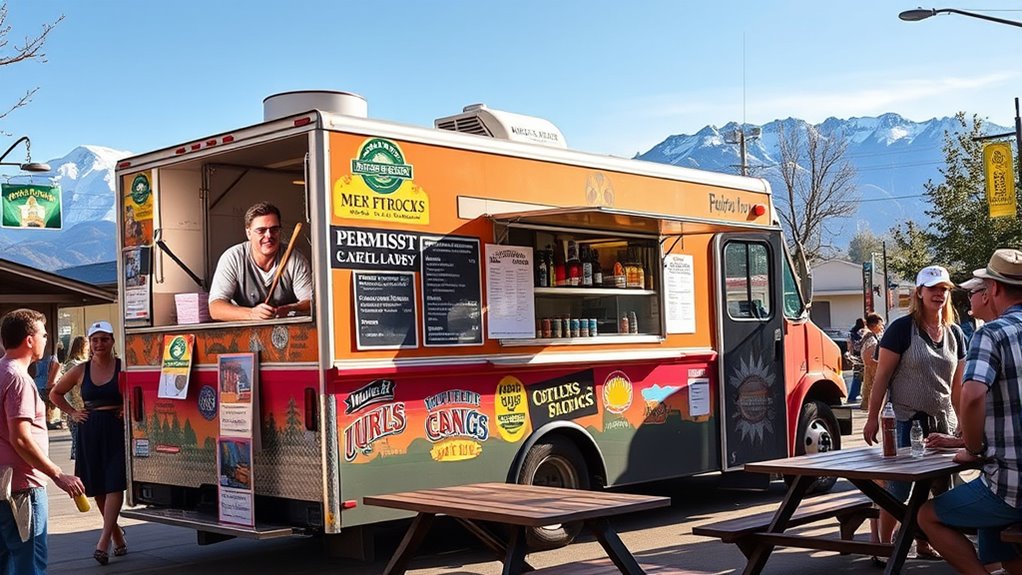
Choosing the right locations and attracting steady foot traffic can make or break your food truck’s success in Bozeman. Focus on spots along 7th Avenue, the hub of food trucks, or near downtown and event venues. The Bozeman Food Truck Park on 1804 West Babcock Street offers consistent customer flow with staple trucks like Curry Express. Minimize location changes for reliability, as customers value familiar spots. To stand out, tailor your menu to local tastes, offering tacos, burgers, BBQ, or ethnic dishes. Add beverages or desserts to boost sales and price competitively. Use social media to announce locations, participate in events, and partner with local businesses. A visually appealing truck design and loyal customers through reviews and loyalty programs will help sustain your success. Additionally, aligning your payment processing with efficient solutions can streamline transactions and enhance customer satisfaction.
Frequently Asked Questions
How Long Does the Permit Approval Process Typically Take in Bozeman?
The permit approval process in Bozeman usually takes several weeks, depending on how complete your application is and how quickly inspections are scheduled. You’ll need to submit detailed plans, pass health and safety inspections, and address any required corrections. Keep in mind, delays can happen if additional documentation or re-inspections are needed. Overall, plan for a timeline of a few weeks to a couple of months before you’re fully approved.
Are There Specific Vehicle Requirements for Food Trucks in Bozeman?
So, you want your food truck to meet Bozeman’s vehicle requirements? Well, buckle up! You’ll need a vehicle that’s compliant with safety standards, including fire suppression systems, proper kitchen equipment, and sanitation facilities. Make sure it’s big enough for water tanks, trash disposal, and storage. Plus, it must pass annual safety inspections and maintain proper parking distances. Basically, your truck needs to be a mobile fortress of food safety!
Can I Operate My Food Truck on Private Property Without a License?
You can’t operate your food truck on private property without a license. Montana law requires a valid food establishment license, even on private land. You must get written permission from the property owner, meet health and safety standards, and display your license visibly. Operating without proper permits risks fines, legal action, or closure. So, make sure you secure all necessary licenses and permissions before starting your private property food truck operation.
What Are Common Mistakes to Avoid During the Licensing Process?
When steering the licensing process, you should avoid submitting incomplete or incorrect applications, which cause delays. Don’t treat permits for mobile trucks as temporary setups, and always understand local and state regulations. Keep track of notifications and deadlines to prevent losing your license, and budget carefully for all costs, including permits, equipment, and ongoing compliance. Rushing or skipping steps can lead to fines or license revocation, so stay organized and thorough.
How Often Do Health and Fire Inspections Occur for Food Trucks?
You should know that health and fire inspections for food trucks typically happen at least once a year in Bozeman. Health inspections are unannounced and cover sanitation and food safety, while fire inspections ensure equipment safety and proper fuel storage. Sometimes, inspections increase if there are violations or complaints. You’ll need to pass both to keep your license active and operate legally, so stay compliant year-round.
Conclusion
Launching your food truck in Bozeman is like taking your own epic quest — with the right permits, a tasty menu, and smart marketing, you’re set to thrive. Stay organized, keep an eye on regulations, and adapt as needed, just like a true hero of the modern age. Remember, success isn’t just a quest for treasure but building a loyal community. With determination, you’ll turn your food truck dreams into a legendary local staple.
